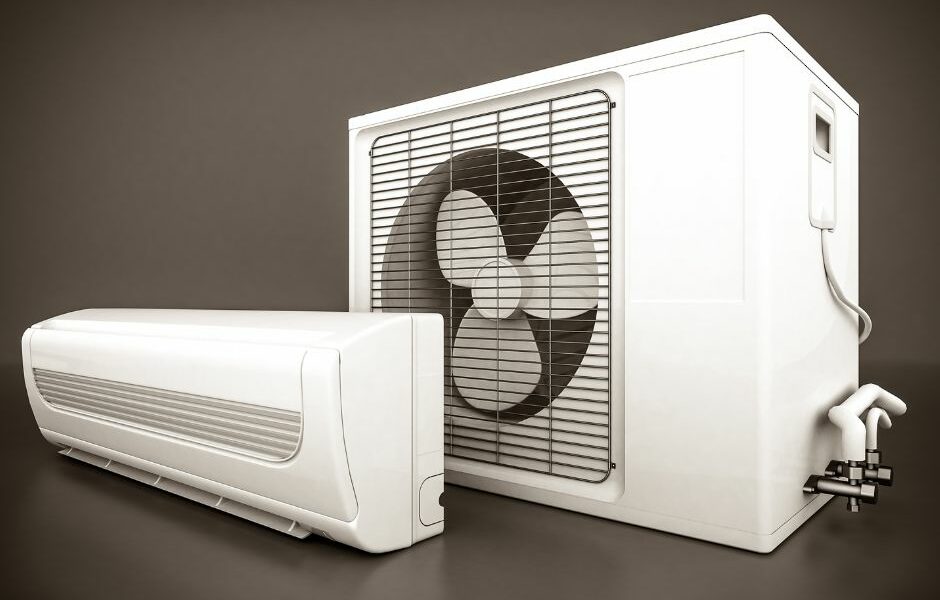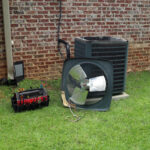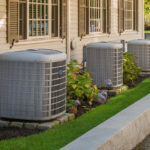
Efficiency is a broad term but typically refers to how much energy an electrical appliance uses. The more energy efficient something is, the less money it takes to power and the less it will impact the world around us. Let’s continue to read to find out what type of home cooling unit is most efficient in 2023.
There are two ways to rate AC units. First, by SEER, Seasonal Energy Efficiency Rating. SEER looks at the efficiency of changes that occur in a cooling season. For example, in the South, the AC will be used quite a bit in summer and a few times in the fall.
ACs are also rated by EER, Energy Efficiency Rating, which rates HVAC peak efficiency. If your climate is consistently dry and hot, EER is a more critical factor. Anywhere else, SEER is more important.
Contact our team to learn what type of home cooling unit is most efficient for your home with the experts at Veterans AC and Heat.

Our 2023 Top Picks for the Most Efficient Home Air Cooling Unit
1| Ductless Units
For older homes and those where it isn’t possible to install ductwork — ductless systems are considered the ideal choice. They are considered the most energy-efficient air conditioning systems on the market. Also, they can be installed in almost any house because they do not require expensive ductwork.
The Pros
- The compact design allows the unit to be installed anywhere and run more efficiently than portable and window-mounted air conditioning systems.
- They function with a heat pump and can also be used as heating systems in the winter.
- Since the compressor is outside the home, they are quieter than the window and portable units.
- Windows aren’t a must for these units, which means no views are ruined, and there is no security risk as there is when keeping a window open.
- It is installed easily without a lot of ductwork.
- You can control the temperature of each room separately.
The Cons
- Ductless units must be run outdoors. No doubt, the units are made to run very efficiently. Still, ductless units are often more expensive than window or portable ones.
- Drilling through your walls is required, so ductless units should only be installed by a professional.
- A single ductless mini-split unit cannot cool a whole house adequately.
2| Central Air Systems
Central air conditioning systems are ideal for those looking for the most efficient way to cool their homes. Suppose you have ductwork already in the house; you can use the same infrastructure your furnace uses to heat your home.
You can customize your home’s temperature based on individual needs. Cool air is distributed evenly in each room, meaning only one unit for your entire home. Most central air systems are controlled by return and supply registers in each room.
The Pros
- Central air cooling is the most cost and energy-efficient method for regulating temperatures in your home.
- All components of a central air system are outside, so you can enjoy a silent and secure way to cool your home.
- Since cool air is circulated in all rooms, humidity is reduced around the house, making the overall environment more comfortable.
The Cons
- It requires annual maintenance to run most efficiently.
- The initial cost can be extremely high if you need new ductwork to be installed.
- It consumes a lot of energy, resulting in a higher energy bill.
- This unit type may lose efficiency and effectiveness if a problem arises in the ducts.
NOTE: If you have ductwork from your heating system, installing a central air system can be cheaper than a ductless system.

3| Window Air Conditioner
Since the beginning, window air conditioners have been labeled champions of cooling smaller rooms and are regarded as the most common type of air conditioner. They come in various sizes and are suitable if you want to cool a small area. Suppose you choose a large window air conditioner. In that case, you can even cool a small home, considering it is a single-story or one open space.
A window AC is a single unit with all components inside. It puts heat out of its outdoor side and blows cool air into the room on the indoor side. These units are installed in a window or by cutting a hole in the room’s wall. They have controls on the unit and may also come with a remote. They have a filter that slides out so it can be cleaned regularly for total AC efficiency.
The Pros
- Window units typically cost less and are cheaper to run.
- They are easy to install.
- Upkeep of the system is simple.
- They don’t take up a lot of floor space.
The Cons
- It can be loud while it’s on and is visible from the outside of your house.
- Window units can obscure the view from a window and must be close to a suitable electrical outlet.
- Not all windows support air conditioners, and some window ACs are unsuitable for casement or irregularly shaped windows.
4| Hybrid / Dual Fuel Air Conditioner
A hybrid system combines a gas furnace with an electric air-source heat pump that delivers cost-effective and efficient performance when it comes to heating and cooling. It depends on the temperature outside, but the system automatically switches between burning fossil fuel and using electricity. Luckily, you can set the temperature for when the system changes from the heat pump to the furnace, or you can switch it manually.
When it’s hot outside, the heat pump works as it pulls hot air from inside your house and puts it outside. This process is reversed when it’s cold outside, and heat is distributed throughout your home. When the temperature is too cold for the heat pump to function efficiently, the furnace kicks in.
The Pros
- A hybrid will maximize indoor comfort and minimize the cost of your utility bills.
- Hybrids also lower your carbon footprint.
The Cons
- There is a high cost for the initial setup.
- Breakeven may occur in the long run, but it is hard to tell.
Essential Things to Consider When Choosing What Type of Home Cooling Unit Is Most Efficient
Now that you know the different home cooling units available, it’s time to decide on the best-suited system for your house. These are the most important things to consider:
1| Your Budget
- The cheapest options out there are window air conditioners & portable air conditioners. Note that such types of air conditioners can only cool a single room at a time.
- A ductless air conditioner or a mini-split AC is considered cost-effective if you only cool a room or two. Opt for cooling your entire home on a single ductless system. You’ll have to always keep it on, adding to your energy costs with low effectiveness.
- Depending on the type (mini-split, window, or portable), Smart ACs can cost a little more than typical conventional counterparts. Although, it will result in energy-saving and are not as pricey to run. Smart AC controllers cost around $70 – $120 and provide the same functions.
- Central air conditioning units are more expensive than all previous types, but they are also considered more effective. Moreover, these air conditioners last longer than portable & window air conditioners. The running cost of them though is a lot higher.
- Geothermal heating and cooling is the most expensive option. However, it tends to pay for itself over time by saving energy. The effectiveness and efficiency of geothermal units are unmatched compared to the other types of ACs available. Some say that spending a lot of money on getting a system like this could last you close to the rest of your life.
2| Energy Usage
- Purchasing an energy-efficient air conditioning system that can help decrease your utility bills. It is important to check so that the most cost-effective option can be considered. The energy efficiency ratio is also known as the EER rating. The higher the rating, the more efficient the system is.
- Another closely related parameter is the SEER. The SEER rating of a unit is the cooling output divided by the total electric energy input during the same period.
- Although the SEER rating may sound like EER, the difference lies in the fact that the SEER is calculated over a whole cooling season of many months at different temperature points, while the EER is only calculated at a fixed temperature point. Again, the higher the unit’s SEER rating, the more energy-efficient it is.
3| Space Requirements and Maintenance
- The ease of the MAINTENANCE LINK is crucial if you wish to prolong its life for the years ahead. Similarly, always buy an air conditioner best suited for your home’s space.
- There are many types and brands available. Choosing one depends on your space requirement, budget allocation, ease of use, and maintenance.
4| Cooling Power
- British Thermal Units (BTUs) measure an air conditioner’s cooling or heating capacity. The higher the BTUs, the more cooling or heating power a unit has. This specification applies to smart ACs only to any air conditioner you are about to buy.
- Standard BTU capacities range from 6,000 to 12,000, which is suitable for a common-sized living room. It would be best if you looked for an AC that is suitable for your room size. This will help consume the least amount of energy while providing the best cooling or heating.
What Type of Home Cooling Unit Is Most Efficient for Your Home?
Good news– the experts at Veterans AC & Heat can help you get down to the bottom of what home cooling system you really need to be running in your home. Just give us a call to get on the schedule and we will gladly come out to perform an inspection and get your AC cooling before the summer heat sets in.
Contact Veterans AC & Heat Inc. today so we can help you install the most efficient AC unit for your home.



